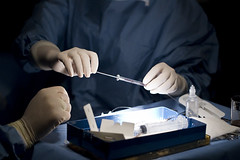 |
| Stem cells: where do they really come from?Does having more of them make you healthier? Can you make more of them? Miracle Pill says yes, yes, and yes! (Photo credit: BWJones) |
Very often, the nutritional supplements use weasel words to sound as if they do something, when they don't. FDA is very strict on what a company can say about products that goes on or in the body, and one misstep can result in thousands of dollars in fines. One nutritional supplement company claims their product "supports your body's natural release of stem cells".
Wait, what does that mean?
It doesn't mean anything, because what they claim is not scientific fact. Their literature claims
Recent scientific developments have revealed that stem cells derived from the bone marrow, travel throughout the body, and act to support optimal organ and tissue function. Stem cell enhancers are products that support the natural role of adult stem cells.Is what they claimed true? Not really.
The US National Institute of Health, a Federal agency has a website on stem cells, it clearly says that scientists do NOT know somatic stem cells (i.e. adult stem cells) come from. Bone marrow produce blood cells and some derivative stem cells, but that has nothing to do with any other stem cells found in various tissues (at least no such relations have been observed).
So what is this "scientific development" that this company claimed? It was written by its founders as a HYPOTHESIS, not a proven research. To quote from the paper's introduction:
Based on a review of the literature we propose the hypothesis that in situ mobilization of stem cells from the bone marrow and their migration to various tissues is a normal physiological process of regeneration and repair and that therapeutic benefits can be generated with less invasive regimens than the removal and re-injection of stem cells, through the stimulation of normal stem cell migration. We further propose that effort should be made to identify natural compounds characterized by their ability to augment this normal process of mobilization and re-colonization of bone marrow stem cells for the potential treatment of various degenerative diseases
If you skip the science jargon, it says
We hypothesize that stem cells generated in the bone marrow actually move about the body to help body heal, and if we can stimulate this process it'd be great. We also think we should look for some sort of chemical that can stimulate this process.In other words, this is just a position paper that says "this bears looking into".
Yet this company is selling some sort of algae derived pill that claims to do this very thing: support your body's release of stem cells in your blood.
In other words, they treat their own hypothesis as FACT. So where's the research? There's some tests in mice about stem cells injected into blood stream, but no human trial, much less any proof that this algae will promote more stem cells in your blood.
You can find more about this alleged product / woo on Dr. Barrett's QuackWatch website.
So how did I pick this up as unproven science? (I wouldn't quite call it pseudoscience, but it's right on the edge) I followed these ten questions:
1) What is the source?
The source of the info is from the founder / seller, the two Ph.Ds that wrote the paper that hypothesized the source of stem cells in the rest of the body to have all came from the bone marrow.
2) What is the agenda?
The company's agenda is clearly to sell this supplement
3) What sort of language does it use? Does it appeal to emotion?
With claims like "all-natural", "ultimate", "extraordinary", it sure does.
4) Does it involve testimonials?
Yes, it has at least one testimonial per product page.
5) Is there claim of exclusivity?
Yes, it claims to be first to harvest this algae and first to market with this thing.
6) Any mention of conspiracy?
No.
7) Does the claim involve multiple unassociated disorders?
This product only claims to "support" your body's natural release of stem cells, but they also have products to "enhance circulation", and "help move stem cells into your other tissues". The implication is this will make you healthier in general, without making any actual claims of improved health.
8) Is there a money trail or passionate belief involved?
Difficult to evaluate, but it talks a lot about the "opportunity" to sell their products, including "car bonus".
9) Were real scientific processes involved?
Some, as there seem to be some research papers regarding the chemicals, but they are relatively benign, such as "this does no harm when given to mice with tumors", and "this seem to help mice with damaged heart". How the ingredients affect human is debatable.
10) Is there expertise?
Some. The two founders both have history in nutrition, and one has researched in immunology, but neither were really any sort of personality in stem cell research. Recently they added a dermatologist who presents himself as a nutritionist. Hmmm...
So is this thing woo? Very close, enough to not buy it until there's some proven benefit for taking it. But then, the real decision is up to you.
This blog post was inspired by http://www.forbes.com/sites/emilywillingham/2012/11/08/10-questions-to-distinguish-real-from-fake-science/






No comments:
Post a Comment